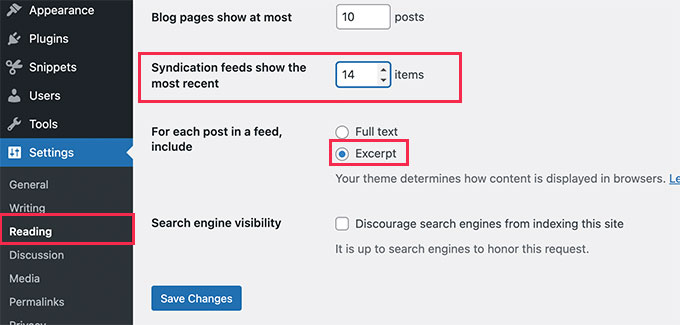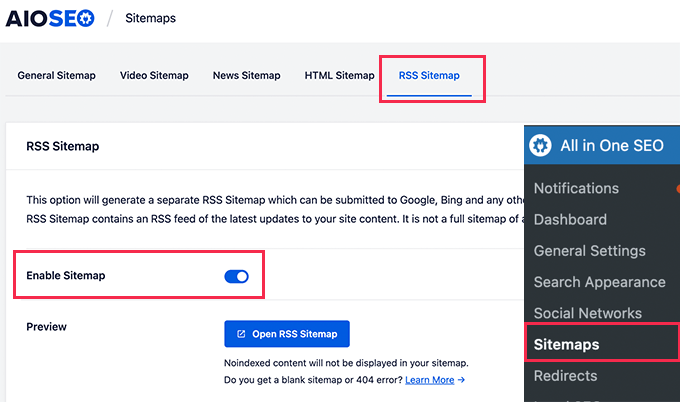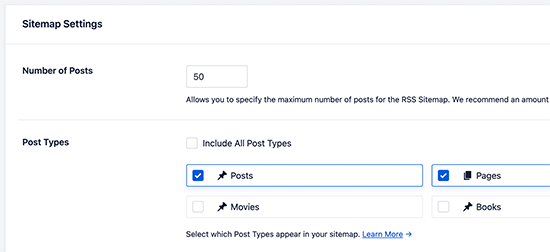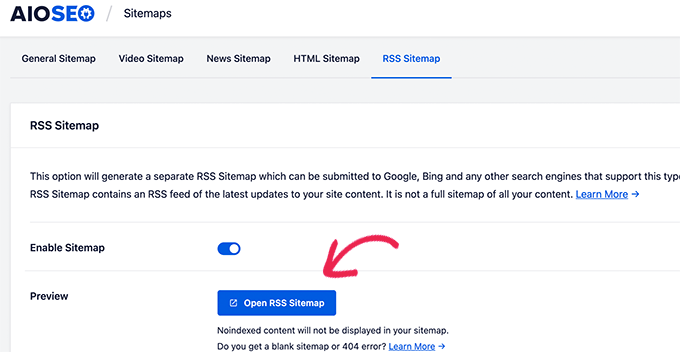By default, WordPress displays the ten latest posts in the RSS feed. Adjusting this number can help tailor the feed to your audience’s needs.
You can manage content visibility by controlling the number of posts in the feed. It also ensures readers see the most relevant updates without being overwhelmed.
In this guide, we will show you how to limit the number of posts in your WordPress RSS feed and how to create an RSS sitemap for better search engine indexing.

Video Tutorial
If you don’t like the video or need more instructions, then continue reading.
Change Posts Limit in WordPress RSS Feed
By default, WordPress shows the ten most recent posts in your main RSS feed. However, you can easily show more or fewer posts by changing WordPress settings.
Go to the Settings » Reading page in your WordPress admin dashboard.
From here, you need to change the value next to the ‘Syndication feeds show the most recent’ option. Simply enter the number of posts you want to be shown in your RSS feed.

Below this option, you’ll also see the option to show either the full text or excerpt of your posts in RSS feeds.
We recommend using the ‘Excerpt’ option for two reasons.
- It limits the content shown in the feed. In our opinion, showing the full article in the feed only helps content scrapers steal your content.
- Excerpts make your feed compact and easy to look at in feed readers. Users click on the article they want to read, which increases page views.
After that, don’t forget to click the ‘Save Changes’ button to store your settings.
That’s all, you have successfully limited the number of posts displayed in RSS feed of your site.
Create RSS Sitemap for Search Engines
If you only want to change the number of posts in your RSS feeds for more search engine visibility, then increasing posts in your main WordPress RSS feeds is not the best way to do this.
Many popular search engines like Google and Bing support RSS sitemaps.
Unlike XML sitemaps, which contain most of your content, RSS sitemaps provide search engines with the latest posts on your site.
This helps search engines quickly find your website’s updated posts. You can set a different limit on the number of posts you want to include without affecting your main WordPress RSS feed.
The easiest way to add an RSS sitemap to WordPress is to use All in One SEO. It is the best WordPress SEO plugin on the market and allows you to optimize your website easily without any SEO skills.
First, you need to install and activate the All in One SEO for WordPress plugin. For more details, see our step-by-step guide on how to install a WordPress plugin.

After plugin activation, you’ll see the All in One SEO setup wizard. Follow the on-screen instructions or check out our tutorial on how to set up All in One SEO for WordPress.
Once you are done with the setup, go to the All in One SEO » Sitemaps page and switch to the RSS Sitemap tab.

From here, you can enable the RSS Sitemap.
You can also set the number of posts you want to include in the sitemap.

This sitemap includes all your post types, including posts, pages, products, and any custom post types you may have.
If you want to include only blog posts, uncheck ‘Include All Post Types’ and select ‘Posts’.
Once you are satisfied, don’t forget to click on the ‘Save Changes’ button to store your settings.
You can now click on the ‘Open RSS Sitemap’ button to copy the URL of your RSS sitemap.

Next, you need to submit your RSS sitemap to Google Search Console. See our step-by-step tutorial on adding your WordPress site to Google Search Console.
We hope this article helped you limit posts in your WordPress RSS feed. You may also want to see these practical tips on optimizing WordPress RSS feeds or see this tutorial on displaying any third-party RSS feed in WordPress.
If you liked this article, then please subscribe to our YouTube Channel for WordPress video tutorials. You can also find us on Twitter and Facebook.





vicky
hello bro thnx for your help but it doesn’t work my feeds are not updating since 15 01 2016 please check and suggest some settings? i’m using cloudflare and w3tc my site
WPBeginner Support
Try deactivating all plugins.
Admin
Vicky
thnkyuw so much bro… w3tc was issue removed it now can you please suggest some w3tc alternatives to optimize my blog? and speed it up?
WPBeginner Staff
RSS feeds are available on WordPress.com blogs as well. However you can not manipulate them like you can do on a WordPress.org blog.
Dutch opa
Are RSS feeds only available on WordPress.org?Another question: Can I use signups (asking for emails) on WordPress.com? On WordPress.org?